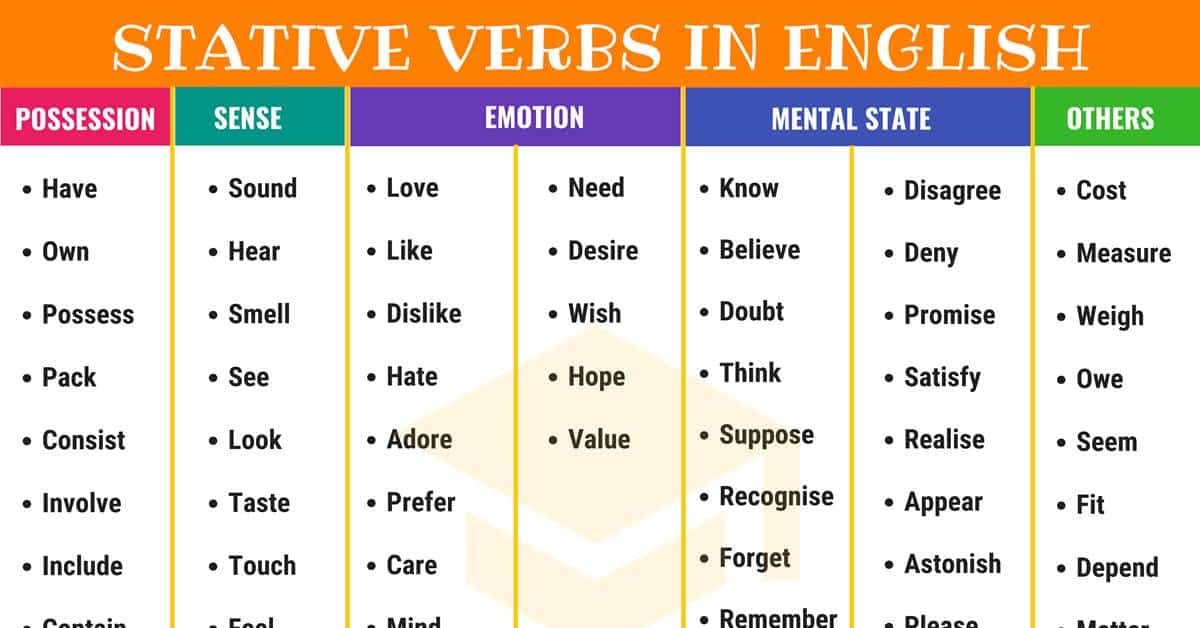This is a continuation of my first lecture on Stative Verbs I. In the first lecture, I explained the nature of stative verbs there.
Today, I’m writing on some verbs that can be stative and dynamic in the same vein.
Although stative verbs may seem complicated at first, you have now taken the first step in mastering them. You now know their nature! Soon, you will start noticing them and the inherent nuances while reading books, website posts, and articles, as well as when listening to songs, shows, and presentations. In no time, you will begin using stative verbs correctly by yourself.
These verbs are: look, appear, think, feel, have, see, taste, smell, be, weigh, ,measure, mind. Perhaps others might exist. I’m going to discuss them one after the other.
LookYou look fantastic in that dress.—stative
She is looking at her reflection in the mirror.—dynamic
The first example tells us how you look in that dress, your current state. While the second example shows how she is checking or admiring herself (which shows an action) in the mirror.
AppearHe appears to be unhappy. (when you tell or describe how a person appears with an adjective, then that is a stative verb)
Another example is he appears sad. "Sad" is an adjective. You wouldn't say he is appearing sad because he has already appeared as such. It can’t be in the progressive form. Another example is the symbol appears in many paintings of the period (to feature or be shown).
She was appearing in concert at Carnegie Hall. This second example means someone showing herself and apparently moving around for people to see her, hence its being a dynamic verb.
ThinkI think (opinion) that Mr Francis is an awesome teacher.—stative (this simply summarizes the opinion you have of Mr Francis).
I am thinking about my family right now.—dynamic verb (this means you are meditating or searching for ways to see or check up on your family hence its being a dynamic verb)
FeelI feel that we ought to accept his proposal.—stative (feel as a stative verb expresses your opinion or simply the feeling you have about something).
I’m feeling a bit dozy this afternoon.—dynamic (feel as a dynamic verb is used to describe the temporary state, as in cold, warm or tired, that you are).
You can also say I'm feeling a bit tired today.
HaveThey have a Mercedes Benz.—stative verb. (it shows a possession).
We’re having a party on Saturday.—dynamic (it means organizing or holding, and invariably having fun that day like drinking and…you name it).
SeeDo you see that bird?—stative (sensory perception).
The doctor is seeing a patient now.—dynamic (checking, asking questions from, or examining the patient).
TasteMmm! This tastes good!—stative verb (sensory perception)
My mother is tasting the potato soup.—dynamic (the activity)
SmellThe stew smells delicious.—stative
Ann is smelling the perfume to see if she wants to buy it.—dynamic
BeHe is immature.—stative (state of being)
He is being immature.—dynamic (temporarily displaying that particular behaviour)
WeighThe suitcase weighs 20 pounds.—stative
The butcher is weighing the meat on the scale.—dynamic (performing that activity).
MeasureThe surfboard measures 2 meters by 55 centimeters.—stative
The architects were measuring the distance between the pillars.—dynamic
MindI don’t mind if we watch a movie tonight.—stative verb (I'd like us to do something)
I’m not being nosy. I’m minding (paying attention to) my own business.—dynamic
Lastly, most verbs that are considered stative can also be used:to head a participial phrase as in having seen her father, she quickly ran away.
as a gerund or a head of a gerundive phrase as in seeing is believing, loving her is not enough, other things must count and in fact, overshadow the consideration for love.
in special cases like I look forward to hearing from you, he keeps/can’t help seeing the woman in spite of the dangers involved, I’m loving this journey (It means right at this second I'm enjoying it. It's also more emphatic and sensory than I love it).
I’m sure you’ve mastered the fine details in verbs that can be used in the stative and dynamic sense, and the special uses of these verbs.
Till I write to you again, please drink a lot of water and mind your own business.
Ciao!
Yours in English,
Francis






Is this correct?
As a To infinitive, e.g
To think Mr. Francis is an awesome teacher is an understatement. He is wonderful and wants the best for his students.